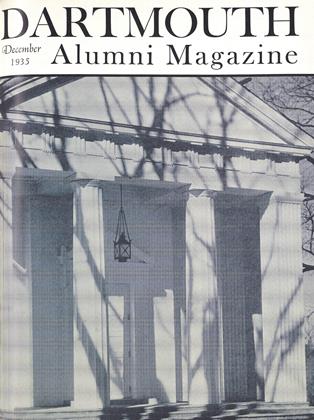THE "AEGIS" of 1908's Senior Year contains the following record:
"GEORGE ELLIOTT SHIPLEY, AƯ,Turtle, Casque& Gauntlet, Palaeopitus.Prepared at Oak Park(Illinois) High School;College activities: TrackTearn '05, '06, '07; Relay,Dartmouth vs. Yale; Relay, Dartmouth vs. Pennsylvania; Inter-Collegiate Relay Team 'O6;Vice-President SeniorClass."
The subsequent record has just been written by his sister, Maud Shipley Leach (Mrs. Ferry W. Leach), of Chicago, and has been published under the title "Hill 7."
Mrs. Leach was seventeen years older than her brother, George. In the introduction to this memorial book she says "Like countless other older sisters, I shared with his mother* the joy of mothering him, and it was a great delight that in his last letter home he wrote of "my Sister-Mother," this giving me the right, in a way, to call him "my son." In the seventeen years since her brother's heroic death in the battle of the MeuseArgonne, Mrs. Leach has devoted herself to the compilation of this volume, despite the handicap of steadily failing eyesight.
The title, "Hill 7," refers to the poetic conception that the author sets forth of seven significant incidents in this man's life, all associated with "hills." The first two were childhood episodes. The third—"Happy Hill, Hanover"—symbolizes "Red" Shipley's joy in the outdoor activities at Dartmouth. The fourth "Hill" is Pike's Peak, on top of which, shortly after graduation, young Shipley and a classmate (the writer of these lines) quite unwittingly performed a public service, while defending themselves against wanton assault and battery. The last three "hills" are associated with Lieutenant Shipley's war service. "Hill 5" is the eminence of Arlington Cemetery which he visited while stationed at Camp Meade. "Hill 6" is at Langres where he was first located in France.
"Hill 7" is Montfaucon from where he went into action with the 4th Infantry, to be killed by a high explosive shell, less than a month before the Armistice. It is around these seven hills that is woven the story of these 35 years of life.
By most of those who read this book, the discussion of the circumstances surrounding George Shipley's death will be read with particular attention. His friends recall the long delay that ensued before his family was notified that he had "fallen gloriously on the field of battle." It was known that he had gone overseas as supply officer with the 79th Division, and yet he was killed fighting with the infantry of the 3rd Division. With patience and persistence, Mrs. Leach fitted the fragments of evidence together. She corresponded with numerous soldiers and studied all available data. The Chaplain who buried Lieutenant Shipley where he fell was located. He remembered the occasion well and his memory was confirmed by his diary, wherein he had noted that Shipley was Dartmouth 'OB.
The story that was finally reconstructed was that at the beginning of the Meuse-Argonne drive, Shipley was stationed with a Hospital Unit of the 79th Division at Geddeon, a few miles south of Montfaucon. The infantry of the 79th, although never before under fire, were in the first attack. They suffered heavy casualties and were finally relieved by the 3rd, a regular army Division. As the wounded of his Division poured back from the front into his Hospital, they brought back news that the situation was critical. Shipley, who was under orders to report to First Army Headquarters, left Geddeon with that in view, but apparently decided that his duty in the emergency lay immediately at the front. He proceeded, therefore, through Montfaucon, and joined Company B, 4th Infantry, 3rd Division, which during the fighting had been constantly receiving replacements.
In 1921 a letter was received from the former personnel officer of the 3rd Division which confirmed the fragmentary reports already received from others, and brought the narrative to a close. It said:—"lt was along about the 11th of October, 1918, that the platoon which Shipley had assigned himself to were to go over the top in an attack: in this attack they were facing the German guns in almost point blank range and the officers in charge of this platoon were either all killed or were casualties at once due to the fact that they were in advance and leading the men: at this stage, Shipley, practically a new man in the company, took charge of the remaining men and succeeded in gaining the required objective, when he was killed instantly."
Those who knew "Ship" best will recognize this as conduct entirely natural on his part.
In Part Two of her book, Mrs. Leach voices her protest against the barbarity of war and her hope that eventually universal justice will take its place. Treasured letters received by her family at the time of her brother's death, the record of the Memorial Service in his honor, and the message of respect received from the French Government, bring the volume to a close.
George Shipley's friends will find great satisfaction in this splendid memorial, so painstakingly created by his devoted sister.
The book is privately printed and the edition is, naturally, a small one. A few copies may be obtained at $3 from the publishers, Messrs. Willett, Clark & Company, 440 South Dearborn Street, Chicago.
Lieutenant George Elliott Shipley
 View Full Issue
View Full Issue
More From This Issue
-
 Class Notes
Class NotesClass of 1911
December 1935 By Prof.Nathaniel G.Burleigh -
 Article
ArticleAND WHAT DOES IT MEAN?
December 1935 By Bill Cunningham '19 -
 Class Notes
Class NotesClass of 1914
December 1935 By Edward leech -
 Class Notes
Class NotesAll in the Day's Work
December 1935 By Claude T.Huck -
 Class Notes
Class NotesClass of 1910
December 1935 By Harold P.Hinman -
 Article
ArticleForgotten Dartmouth Men
December 1935 By Josephine C.Chandler







